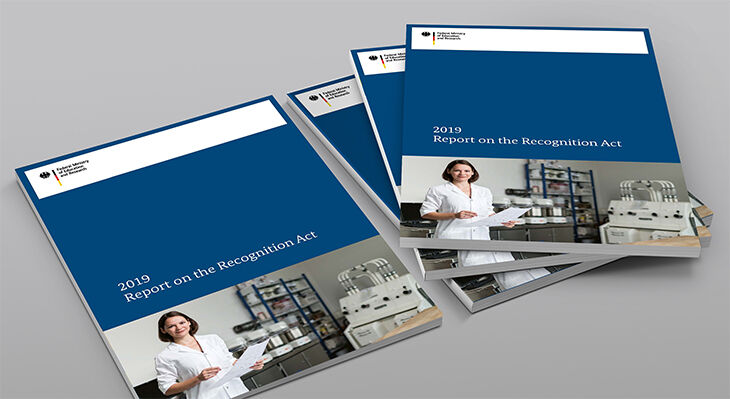2019 Report on the Recognition Act is now available in English
An English translation of the Report on the Recognition Act 2019 is now available. The Federal Government adopted the report of the Federal Ministry of Education and Research on 11 December 2019. The report consolidates the findings of the BIBB Recognition Monitoring. Almost 280,000 applications have so far been made for the recognition of foreign professional qualifications.

The 2019 Report on Recognition is the result of the statutory monitoring of the Recognition Act. This is conducted by the Federal Institute for Vocational Education and Training (BIBB) on behalf of the Federal Ministry of Education and Research (BMBF). The Report on Recognition provides information about the latest developments concerning recognition in Germany.
The recognition procedure checks whether a foreign vocational qualification is equivalent to the respective German reference occupation. From 2012 to 2018, official statistics recorded a total of around 140,700 applications for recognition of occupations regulated at federal level alone, this included approximately three-quarters in the regulated sector (in particular general nurse and medical practitioner) and one quarter in the non-regulated sector. In 2018, around 29,200 equivalence checks were applied for in occupations which fall under federal competence (an increase of 16.8% compared to the previous year).
In 52.5% of completed procedures in occupations regulated at federal level, notification of full equivalence was issued in 2018. No equivalence was the outcome of only 2.3 percent of procedures. More than two thirds (69.4 percent) of applications submitted in 2018 related to a professional or vocational qualification acquired in a third country. The main states here were Syria (3,177 applications), Bosnia and Herzegovina (2,880 applications) and Serbia (2,472 applications).
The Report on Recognition outlines the expected challenges in regard to professional recognition such as a rise in demand for recognition from skilled workers from third countries. This will make the issue of having sufficient human resources to process applications even more important in future. Questions as to how knowledge can be shared even better and how necessary cooperation agreements and networking can be further deepened within the scope of the recognition procedure will also take on greater significance.